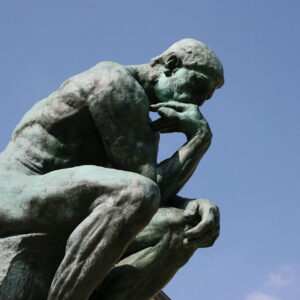I recently read an interview with a guy who had been a life-long criminal. He tried living an honest life but felt he was working too hard and wasn’t earning enough money. He turned to a life of crime because he wanted more wealth, and he wanted it faster. Eventually, he also found his criminal life unrewarding as he still wasn’t garnering riches as rapidly as he desired. He examined his motivations and realized that everything he was doing, honestly or illegally, was because he wanted money. He concluded that since he just wanted cold, hard cash, he would become a counterfeiter and print his own money. That way, he explained, he could “skip the middleman” and go right to the perceived source of his happiness.
I think our friend the counterfeiter is on to something. He wants to be happy, so he takes the most direct route he can think of to secure his goal. Of course he was misdirected in his pursuit, but you’ve got to give the fellow credit for thinking things through to the conclusion. In fact, I’d say that’s the same process that yogis employee to secure their happiness. We’re not counterfeiters, though, we deal in the real currency of happiness.
Yogis are the masters of “skipping the middleman.” Everyone wants to be happy. People identify objects and relationships in the external world which, they believe, support or diminish their happiness. Life then becomes a pursuit of that which provides happiness and avoidance of what seems to bring unhappiness. This is called raga and dvesha, respectively. We all know, however, from repeated undertakings, that this strategy simply does not work. The objects and relationships fail to satisfy for very long. Objects, like children’s toys after Christmas, often end up as more clutter and annoyance. Relationships, which seemed like such a good idea at one time, leave us scratching our heads and pondering in retrospect, “What the heck was I thinking?”
Yogis “skip the middleman” of objects and relationships and go straight to the heart of the matter — happiness. Rather than asking externals to bring the goal, we pursue the goal itself. In an interesting turn of a phrase, the heart of happiness is, truly, found within one’s own heart.
The “million-dollar question,” for both counterfeiters and honest people, is how to get to happiness. What the yoga sages have promised us is that if we sincerely pursue the path of yoga, we will gain the happiness we seek. The operative word is “sincerely,” not “perfectly.” I’ll repeat this for emphasis — sincerity, not perfection should be our attitude. Perfection is a fantasy, an illusion that does not exist. Sincerity is making the effort to make an effort. This effort of “trying” is within everyone’s reach. To give an example, I tell my meditation students to begin by sitting and meditating for just 10 minutes a day. This may not sound like much, but this will amount to 60 hours of meditation a year. You can’t help but heal and grow if you put 60 hours into your spiritual life.
The sages have promised us that if we sincerely pursue yoga we will bring forth the four great boons of life. These are: kama, literally “pleasure,” artha, “wealth,” dharma, “harmony,” and moksha, “liberation.” Kama means pleasure, but the term also implies a comfort in the physical world, a sense of health and well-being in one’s own body. This contentment with one’s body, in spite of all its fallibilities, is a very simple idea but it carries vast implications.
Artha means wealth, with, again, a larger connotation than we ordinarily assume. This wealth is a prosperity of time, of ease, of proportion and, yes, of money. It often baffles me that we Americans live in the wealthiest nation in the world yet complain about lack of money. Relative to the rest of the world, we live like kings and queens. Yet, there is a psychological and emotional sense of lack even while our bank balances dwarf the private holdings of the overwhelming majority of our fellow human beings on the planet.
Dharma means “harmony,” which is finding one’s place in the world and knowing one has a function, a role to play. As my friend, John, put it, “I try to make a difference in my small circle of the universe.” This “making a difference” might seem like a tiny thing, but it is something that is uniquely yours. Never underestimate the value of compassion, wisdom, and humor in any and every situation.
Moksha means “liberation,” or “freedom.” Freedom from what? Freedom from fear! Can you imagine not being afraid? I am not talking about courage, acting in the face of fear. I am talking about the dissolution of fear. This is brought about through kindness, through love. Jesus said, “Perfect love casts out fear.” The yoga path requires us to self-reflect and identify those internal obstructions which make one feel contracted, frightened. As the obstructions are released, freedom comes ever closer. Love increasingly becomes one’s natural, spontaneous mood.
My personal experience, based on 35 years of practicing the yoga path, is that the sages are telling us the truth. In addition, there is nothing here on this path that can’t be accomplished with a bit of practice. There is no hustle here; the yogis have swung open wide the door to wonder. They have offered the teachings generously. Nothing is being hidden, nothing is being charged. Like a bunch of sweet Grandmas, the sages are pleading, “Here, my dear, I have prepared for you a feast.” They are not telling us to relinquish all objects or ignore our relationships. Rather, they are helping us alleviate the pain of co-dependence and dysfunction, to step out of the cycle of exploitation, and actually enjoy the world and our relationships.
We can ignore the teachings of the sages, but we do so at the cost of our own health and vitality. We waste tremendous energy pursuing externals. It’s time to quit paying the middleman. His cost is much too high and his demands too burdensome. Undertake your spiritual practice with sincerity, patience, and a gentle sense of humor. Ignore the calls of the middleman like you would a carnival barker shouting for you to play a rigged game. Come into your Self and find the treasure you were looking for all along.




